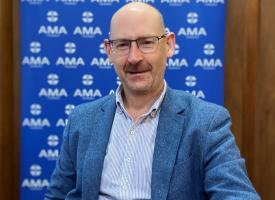Transcript - Dr Bartone - SKY - Elder Abuse, Aged Care
Transcript: AMA President, Dr Tony Bartone, SKY News, with Tom Connell,
Thursday, 6 September 2018
Subject: Elder Abuse, Aged Care
TOM CONNELL: Well, a man has been charged after allegedly repeatedly assaulting a patient at an aged care facility on Sydney's Northern Beaches. It's alleged the 35 year old, who was an employee, assaulted the 82 year old on a number of occasions this month. The man has been charged with two counts of common assault and use of an offensive weapon with an intent to commit an indictable offence. He's been granted conditional bail and will appear in court on 11 September.
Joining me for more on this now is the AMA President, Tony Bartone. Tony, you've issued a statement today with a position on elder abuse, concerned that one in four doctors working in aged care are identifying issues, one in five of us will be over 65 within about three decades - which I guess will include me by then. Talk us through, I suppose, the typical case. Is this a typical case we've seen today of how this occurs; a worker and an elderly patient?
TONY BARTONE: And thank you for having me on, Tom. When we're talking about elder abuse, there are many facets, many different environments and situations it can occur in. This is one example and, unfortunately, it's not an infrequent example. It's an example of where training and preparation by the facility in terms of the staff they employ has probably been less than satisfactory if we're looking at a general sense. We know that if we look at the residents of aged care facilities, as much as 90 per cent of those in aged care facilities have either a complex behavioural or mental health issue, 52 per cent have dementia. So, we've got to expect that we need to have really good standards of training and preparation.
TOM CONNELL: So, when you talk about those type of people, you're talking about people - and I'm not trying to be insensitive here - but they can be very difficult to deal with. Some people with dementia can at times be violent, for example. What do we hear often of the perpetrators of this type of thing, in terms of why they did it?
TONY BARTONE: It's important to understand that, yes, they can be a ‘complex set of needs’ individuals, but they have the same right to care as any other Australian does. They've contributed to society, they've been productive for a number of years, they're now in the twilight of their years, require the care and treatment they deserve. And this is not a good look, and good example, and certainly not what we would expect for the care of any one of us when we get to that age of our parents, of our uncles, our aunts, whatever the case may be.
TOM CONNELL: Catching them out seems to increasingly be a case of CCTV, as we've seen with the footage today. In terms of stopping it happening, though, you spoke about training. Now, why are we failing in this area?
TONY BARTONE: To look at the whole situation that is aged care it's to understand that funding is failing on so many levels; if we look at the number of facilities, the number of beds available, the number of staff, the proportion of trained nurses, the proportion of training that goes into the preparation….
TOM CONNELL: So, trained nurses versus other staff that don't have the same level of training, basically?
TONY BARTONE: Absolutely. But even the training that goes into aged care facilities for nurses has to be different to the training that they have for a general ward or for a domiciliary visit. It's specific and it goes to the funding constraints that the facilities are facing. They're in a really tight economic envelope at the moment and, of course, they're trying to make do with less and less and less in a situation where the demand and the needs become more and more. If we look at the average resident in an aged care facility, they are becoming more complex and more are requiring additional care. And yet, that's being provided by more personal care attendants and other types of health care workers rather than nurses.
TOM CONNELL: So, is the reality of this that the more money you have, you're going to go to a better private facility. If you've got endless amounts of money to spend, you'll have better care, better facilities, even better activities for people. And that's the reality of this system at the moment?
TONY BARTONE: Certainly, at the moment, money will talk. But even where the money does talk, it's still not going to be the access that you'll require. And it's important to understand that we really do need to look at the whole envelope everything from the pre-aged care facilities - so, most people want to stay at home but the aged care packages aren't there to allow them to stay at home…
TOM CONNELL: They were increased in the recent budget but not in a net sense…
TONY BARTONE: A drop in the ocean, mate. A drop in the ocean. We really need to get serious about aged care at the moment. We've neglected it for far too long. It's an increasing proportion of our population, 22 per cent of the population will be over the age of 65 by 2056.
TOM CONNELL: As you've got all the boomers ageing, this is where it's really starting to hit home. And a lot of them want to work later and stay at home, as you say.
And I want to turn to the work part because we had the aged pension increase scrapped by the Government. It seemed to be mainly a result of reality of the Senate. What did you make of this move?
TONY BARTONE: Look, the economics of that I'll leave to one side. But what we do need to recognise is that as we are increasingly ageing and living for longer, we will have a group of Australians that will have productive capital, intellectual capital, and the physical capital that can be part of the workforce. And that needs to be recognised. So…
TOM CONNELL: Yeah, so, you want to encourage people to stay in work. I guess the big thing is, there's a huge difference, I should say, an accountant retiring at 70 versus 67 might be perfectly reasonable depending on their health obviously, a mechanic, particularly maybe here in Canberra, those cold mornings and trying to get under a car, well, being 67, 68, 69, as a mechanic doesn't sound too attractive.
TONY BARTONE: That comes back to labour force retraining. We need to understand that just because you're no longer able to complete the discipline that you grew up working in, doesn't mean that you're no longer a benefit to society. And the opportunity to retrain into a different field, a services field - and aged care is another example where this could possibly happen…
TOM CONNELL: How realistic is that for everyone, though, in these situations? In manual jobs in their sixties, I mean…
TONY BARTONE: I'm not saying that everyone should be retrained and have to work until 70. What I'm saying is that, if they've got the capacity, the desire, and the will, they should have the opportunity too, and not have an enforcement of a retirement age.
TOM CONNELL: And no one's talking about enforcement but it's a- I guess, it's about those incentives the same time, that you want to make sure people - and a lot of these might be on higher incomes that could afford to retire - you want to retain an incentive, I guess, to keep in the workforce.
TONY BARTONE: I think the other side of the question - very quickly - is to recognise that we will be living for much, much longer than when the original pension age was first drawn up. So, we're going to be living for decades longer. And the quality of life, especially with superannuation, perhaps hasn't been all that it might have been for the period coming up to retirement, may be a significant reason why a lot of Australians will want to remain…
TOM CONNELL: Yeah, and not to mention the Budget. I know you said put economics to one side, but it's impossible to do that when you're talking about- it's still sustainability of the system and ultimately the pension might get smaller if we're taking it earlier. So…
TONY BARTONE: We need to look at that, we need to ensure that that becomes a reliable option going forward.
TOM CONNELL: We'll see if anyone else dares to move on this because Labor's campaigned long against it. And now, it's dead for now. But I suspect it will be rearing its head again in the future. Tony Bartone, thanks for your time today.
TONY BARTONE: My pleasure, thank you.
6 September 2018
CONTACT: John Flannery 02 6270 5477 / 0419 494 761
Follow the AMA Media on Twitter: http://twitter.com/ama_media
Follow the AMA President on Twitter: http://twitter.com/amapresident
Follow Australian Medicine on Twitter: https://twitter.com/amaausmed
Like the AMA on Facebook https://www.facebook.com/AustralianMedicalAssociation



